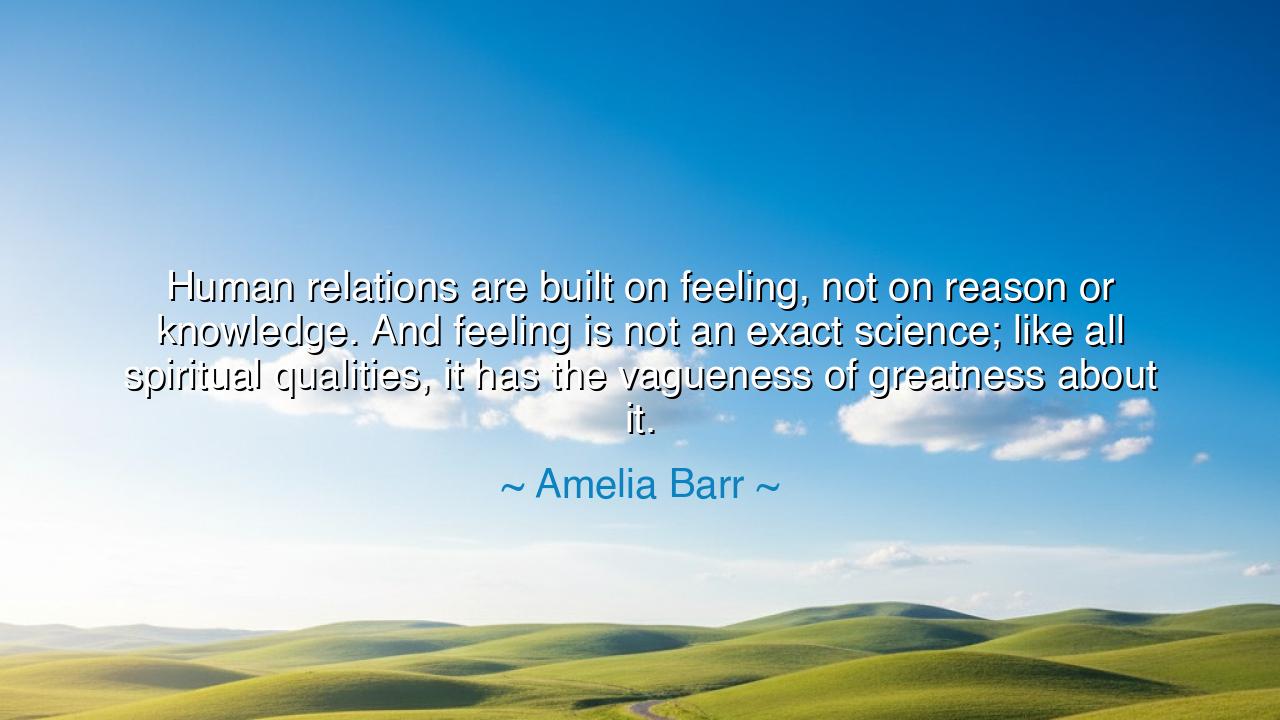
Human relations are built on feeling, not on reason or knowledge.
Human relations are built on feeling, not on reason or knowledge. And feeling is not an exact science; like all spiritual qualities, it has the vagueness of greatness about it.






Amelia Barr, the novelist who gave voice to human struggle and triumph, once said: “Human relations are built on feeling, not on reason or knowledge. And feeling is not an exact science; like all spiritual qualities, it has the vagueness of greatness about it.” These words reveal a truth that is as old as the heart itself: that no calculation of the mind, no cleverness of logic, can bind souls together. It is feeling, the unseen current of empathy, love, and trust, that forms the true foundation of all human connection.
The meaning of her words is profound. Reason may persuade, and knowledge may enlighten, but neither can hold a child in its mother’s arms, reconcile two estranged friends, or inspire a nation to sacrifice for freedom. It is feeling—that strange, immeasurable power—that gives warmth to words and meaning to actions. Barr calls it a spiritual quality, because it rises above calculation, defies measurement, and yet shapes lives more powerfully than any law of science. Its vagueness is not weakness but majesty, for in its mystery lies the greatness of the human soul.
The origin of this wisdom flows from Barr’s own life. Born in England, widowed in poverty, she raised her children alone in America while struggling as a writer. She knew hardship not in theory but in the flesh. Yet it was not mere knowledge that sustained her—it was the feeling of devotion to her children, the bonds of friendship, and the compassion of others. Her success as a novelist came not from technical mastery alone but from her ability to portray the depth of human relations, showing that love and loyalty outweigh reason in the battles of life.
History, too, affirms her truth. Consider the story of Abraham Lincoln. As president in the time of civil war, he possessed great knowledge of law and reasoned carefully about policy. Yet what bound the Union together was not logic alone but his profound feeling for the suffering of his people. When he wrote, “With malice toward none, with charity for all,” he touched the hearts of millions. His leadership was great because it was not cold calculation but compassion turned into action. Thus, Barr’s words live: human relations are built on feeling, not reason.
The ancients also understood this mystery. The Greeks revered logos, reason, but they also honored pathos, the power of emotion to move and unite. In the epics of Homer, warriors fight not because of logical arguments, but because of loyalty, grief, love, and wrath. Empires rose and fell not only by swords but by feeling—the intangible spirit that bound tribes, families, and nations together. Reason orders society, but feeling gives it a soul.
The lesson for us is clear. In your dealings with others, do not rely only on argument, cleverness, or credentials. Seek instead to touch the feeling that lies beneath. Be compassionate in friendship, tender in family, and empathetic in leadership. Remember that to win an argument may bring pride, but to win a heart brings loyalty and trust. Logic builds systems; feeling builds relationships, and relationships build civilizations.
So what must you do? When you speak, let kindness be your first language. When you work, value not only results but the bonds you form with others. When you lead, be steady in reason, but warm in feeling—for people will forget your arguments, but they will never forget how you made them feel. Practice listening more than speaking, giving more than taking, and feeling more than calculating. In this way, you will walk in the greatness Barr describes, the greatness that is vague yet powerful, unseen yet eternal.
Thus remember Amelia Barr’s words: “Human relations are built on feeling, not on reason or knowledge … it has the vagueness of greatness about it.” Let this wisdom guide you. For though knowledge sharpens the mind, and reason steadies the path, it is feeling that binds humanity together, lifting us from mere survival into the realm of love, community, and the greatness of the human spirit.






AAdministratorAdministrator
Welcome, honored guests. Please leave a comment, we will respond soon